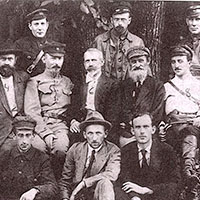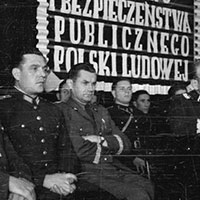Maria Gurowska / Maria Zand
Maria Gurowska, born as Maria Zand in 1915 in Lodz, was a Polish communist judge during the communist period. She was born in Lodz to a Jewish family. Her father was a bookkeeper and commercial broker. She graduated from the Faculty of Law at the University of Warsaw. As a student she joined the Communist Party of Poland Communist Party of Poland (KPP, polish: Komunistyczna Partia Polski) – a communist party operating from 1918 to 1938..
Communist Party of Poland (KPP, polish: Komunistyczna Partia Polski) – a communist party operating from 1918 to 1938..
Between 1950 and 1954, she was a member of the judges of the secret section of the Voivodship Court in Warsaw - handing down falsified sentences in political cases commissioned by the management of the Ministry of Public Security Ministry of Public Security (UB, polish: Urząd Bezpieczeństwa) - secret police, intelligence and counterintelligence agency operating during the communist era of the Polish People's Republic. Identified with communist crimes; murders and bestial torturing of those fighting for independent Poland.. She actively participated in several high-profile political trials of the Stalinist period. Among others, on the basis of evidence fabricated by the prosecutor Helena Wolińska, she sentenced August Emil Fieldorf to death:
Ministry of Public Security (UB, polish: Urząd Bezpieczeństwa) - secret police, intelligence and counterintelligence agency operating during the communist era of the Polish People's Republic. Identified with communist crimes; murders and bestial torturing of those fighting for independent Poland.. She actively participated in several high-profile political trials of the Stalinist period. Among others, on the basis of evidence fabricated by the prosecutor Helena Wolińska, she sentenced August Emil Fieldorf to death: The convicted Fieldorf does not deserve mercy. The convict showed great intensity of criminal will. (...) In the court's opinion, there is no possibility of rehabilitation of the convict
.
As recently as 1995, facing the threat of conviction for Stalinist crimes, she wrote to the Minister of Justice: August Fieldorf was convicted of being one of the leaders of the Home Army
. Gurowska, educated and intelligent, knew that Nil's trial was being conducted under the specific thesis - a hero general with such respectability and charisma could have become enemy number one of the Soviet system, which was hostile to Poland. Home Army (AK, polish: Armia Krajowa) – the clandestine armed forces of the Polish Underground State during World War II. and it was called a judicial murder. In fact, August Fieldorf was convicted of having used his position to organise and lead a group called 'Kedyw', which, during the German occupation of a vast area of Poland, over a long period of time (as far as I remember - about two years) carried out murders on civilians, people hiding from the occupier because of their political orientation or non-Aryan origin, and Soviet prisoners of war who escaped from captivity
Home Army (AK, polish: Armia Krajowa) – the clandestine armed forces of the Polish Underground State during World War II. and it was called a judicial murder. In fact, August Fieldorf was convicted of having used his position to organise and lead a group called 'Kedyw', which, during the German occupation of a vast area of Poland, over a long period of time (as far as I remember - about two years) carried out murders on civilians, people hiding from the occupier because of their political orientation or non-Aryan origin, and Soviet prisoners of war who escaped from captivity
The investigation into the crime committed against August Emil Fieldorf was initiated in 1992 by the Chief Commission for the Prosecution of Crimes against the Polish Nation. After its completion, she was charged with the crime of murder. During her interrogation, Gurowska maintained the legitimacy of her death sentence, still considering it just. She never showed any regret or remorse. She had to be forced by the police even to read the investigation materials. She then fled from Warsaw to the village of Jedwabno in the Mazurian region. She never appeared before the court and did not come to any hearing.
She died in Jedwabno, where she was buried without being held responsible for the two crimes.